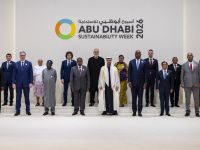Iran's latest major oil and gas discoveries will help return the world market's attention to the low-cost energy reserves in the Gulf, to the benefit of Iraq and Saudi Arabia, analysts say.
The finds also add to the pressure on the United States to reconsider its unilateral sanctions against Iran, as US firms find themselves increasingly unhappy at being locked out of Iran's lucrative energy sector.
"The discoveries are very much indicative of the huge potential of the Gulf countries," Fadhil al-Shalabi, executive director of the Centre for Global Energy Studies, said from London.
"In Iran and Iraq there will be much more oil to discover than we know," he said. "The Gulf has tremendous reserves of inexpensive oil, and as the market remembers this it will help both nations, as well as Saudi Arabia."
Other resource-rich areas such as the North and Caspian seas are saddled with higher exploration and recovery costs than the Gulf countries, meaning the market should naturally gravitate back to the region, he said.
Last Sunday Iran announced the discovery of the Changuleh oil site with an estimated 1.07 billion barrels of oil as well as the Zireh gas field thought to hold 800 billion cubic feet of gas.
The announcement came one week after the oil ministry said it found recoverable reserves of 4.7 trillion cubic feet of sweet, non-sulphurous gas and 58 million barrels of gas liquids at its Homa field.
Iran has been expanding its exploration work and said Tuesday it was seeking to conclude an additional 1.4 billion dollars of foreign investment to develop its gas sector in the next two years.
Meanwhile Japan, which is the world's number two consumer of oil after the United States, sent a high-level delegation to Tehran last week for the first-ever direct energy talks between the two nations.
Any resulting deal will increase the pressure to end US sanctions on Iran, as France, Italy, Norway and Russia have already established a presence in Iran's energy sector.
"Tokyo and Washington of course remain close allies," said a Western analyst who asked not to be named. "But the fact of the matter is that Japan needs oil, and Iran has it. The US sanctions are irrelevant."
Oil requirements are "pushing Japan and other countries to seek access to cheaper supplies, irrespective of the US policy," said Shalabi, a former top OPEC official and longtime opponent of the US sanctions on Tehran.
"The French have done it, the Italians have done it -- maybe next it's the Chinese or Japanese, because Asia will need more oil in the future," he said, adding that a US return to Iran would be to the benefit of all.
US oil officials have pleaded their case before Congress that the sanctions, personally ordered by President Bill Clinton but due to expire next year, are only serving to hurt their industry.
Iran for its part has repeatedly said it would welcome US investment, underlining that the only thing keeping US oil firms out of the Islamic republic is Washington's sanctions policy.
Shalabi added that OPEC moves to keep prices high are encouraging the development of regions like the Caspian, which he said would hurt the cartel in the long run by focussing attention away from the Gulf.
"The Middle East, although it accounts for more than two-thirds of the world's oil reserves, is still underexplored," he said.
"The policy makers in OPEC, and in the Gulf in particular, are not really aware of what is going on.". – (AFP)
© Agence France Presse 2000
© 2000 Mena Report (www.menareport.com)








